Interview with Ei JunGue
Interview with Ei JunGue by Ben M. Angel
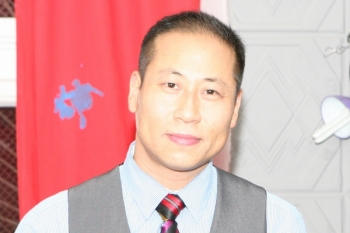 Ei JunGue, founder of the Blue Sky Talent Company and Dom Talanta time cafe. Photo via Blue Sky Talent Company
Ei JunGue, founder of the Blue Sky Talent Company and Dom Talanta time cafe. Photo via Blue Sky Talent Company
MH: I had a series of questions, and some of them you’ve already answered, but will try to go through them as I’ve listed them. Thank you (for the treat), what is it called.
Ei: It’s called “I-have-no-idea”. It’s a rice cake. It’s very traditional. A lot of our foods arrived out of poverty. Things that I still remember in the 70s, we had hardly any treats, grandmothers and parents tried to use what they had to make sweets. Even burnt rice at the bottom of the stove pot, they would steam it, crisp it in oil, put some sugar on top, break it and turn it into biscuits (cookies). And now they’ve become a product of their own. You could buy this in a packet back home.
Introducing Ei JunGue
MH: So you were a first generation Australian (from Korea). What was it like to relocate into Australia?
Ei: It was extremely terrible. During this time, in Korea, we didn’t know what Australia was. Anything English-speaking in our world, in Korea, it was more associated with America. So, I actually thought I was going to America, and I was telling my friends this. (The association) comes from watching Sesame Street. Going to America, you start romanticizing that people are very fascinating. Anyone white, you start going, “Oh wow.” So I met this white boy at the airport about my age, and we started to hang out, and I just went, “Your color is so white.” The mentality of a monoculture in Seoul, of the developing nation we had, it had very little opportunities for my parents who lived in extremely tough conditions just to survive. What I enjoyed about this environment was the family and community structure. Everybody, in order to survive, had to help each other and humility and modesty was pure. And I had the time of my life. We didn’t have the luxuries, we hardly ate any meat; it was mostly vegetables. But for me, that was happiness. We were with our own kind, with what he had. Then boom! Overnight (in Australia), I had to get used to a whole new climate, different food. Language was the biggest problem for me. It took over ten years just to learn English.
MH: You have a very definite Australian accent. I can tell that.
Ei: I challenged myself to be the opposite, by being more Australian than the Australians. And it actually had a terrible detrimental effect. I ended up drinking so much beer.
MH: Fosters?
Ei: Actually, Fosters you don’t drink in Australia. They have very good PR (and so non-Australians think all Australians drink Fosters). Of course, to fit into Australian culture, you had to overcome all the prejudices. Living in a white town as an Asian, the only Korean family, it was tough to overcome simple barriers like languages, prejudices… luckily we had Dutch neighbors that helped us, they turned us into Catholics.
MH: You were an engineer before you went into this.
Ei: Yes, I’ve been in the engineering game for close to 30 years.
MH: What were some of the highlights of your career?
Ei: Around 2006, there was an explosion for resources of oil and gas, and my specialty was automating projects using my background of IT, technology, combined with design and construction, and projects; this small, small specialty. It took a long time for engineering to become popular. At one stage there was a lull in engineering, back in the 90s. But around mid-2000, the world needed energy. Canada went crazy with the oil shale projects, and actually China exploded with an energy need for their manufacturing. I was just working hard in a field that I entered because of my father’s background, it was his engineering company.
MH: So it was a father-son thing?
Ei: He wanted it to be, but I didn’t like working with him because of the difficult conditions. But we did what we did to survive. And it has an interesting background. Industrialized countries, they focused on manufacturing, steel-making, all this engineering work. And around 2005-6, it exploded. And I come from a very humble background. I didn’t study so much at all, I just went to a technical college for this combination of IT and engineering, and it took me around the world to set up new projects in offices, and that sort of thing. I worked for some of the biggest companies around the world.
MH: What were some of the firms you worked with?
Ei: Doing projects with international gas mining companies. It sounds exciting when they say these branding names, but in the end, it’s a long time isolated out here, mainly surrounded by grumpy old men. (Normal) life’s not so dark. In this construction engineering field, a lot of my friends started when they were about 14, and they never met girls before until they’re like 40 years old. Back in Australia, I’d have to introduce them to, like, ballroom dancing. Because you know in Australia we’d start working at a young age of 14 back in the early days of these apprenticeships, and there was a big imbalance between different work cultures.
Talent, Creativity, and Belarus
MH: Your interest in talent and creativity, how did that derive?
Ei: That derived because my mother is incredibly artistic, she was a high school teacher, and she introduced me to a lot of photography – she sent me to an arts school I think when I was 5 years old, for one year. Just the enjoyment of going to this small arts school when you are only 5 years old, it creates the initiation for a person to have some kind of ‘like’. To like something, you have to try it. How do you say you like something if you’ve never tried it? So this incredible period of experiences comes from when you can dream and feel like it’s real. When you get older, someone tells you that it’s not real. There are so many things that I think by the time you become an adult become not so positive. When you are young, parents can instill ideals and dreams, and to make them feel lucky enough to be someone. I feel at this age I was very lucky to have a creative mother, and she pushed very hard for me to have sports, arts, and music. My father forced me to go into engineering, which was absolutely not what I wanted. I wanted to be an art teacher. But in the end, you can still accept what your responsibilities are, and still change to what you want to do, if you have imagination.
MH: I was reading a bit of your background online, and I think I read somewhere that you had said that you discovered that Belarusians as being part of a country with a high concentration of undiscovered talent. I think it was that you were in Lithuania. Could you go into some of the details of how you discovered that?
Ei: Absolutely. I worked as a talent scout in the engineering field, and I think (finding Belarusian talent) was just by chance because I had a good network. And the other thing is I’m very particular about people. I like people with good work ethics. When you do projects, you depend on every person on a project team to do their part, otherwise, your project will fail. In a construction project, that results in millions of dollars. So clients enjoyed having me as part of a project. I was insurance that it would be good.
It was very hard at first because I didn’t have a reputation. After some years of building up a reputation as being a trainer, a teacher, and when the resource crisis happened around the world, everyone was just sort of advertising standard descriptions of, “We need,” say for a typical project of engineering construction, it will be “2000 people,” and you need to man up in one month. Australia had no (human) resources. I had to fly around the world having interviews in hotels, sign contracts, and fly them back within a very short time. It was crazy. Then I started to do something strange. Typical human resources companies for oil companies would typically do just a standard advertising. We were paying staff, 21 years old, a hundred dollars an hour for doing very menial stuff like document control. It was crazy time, and in some parts it still is. No qualifications needed. You just needed to know how to do the job. The world was going crazy. Can you imagine giving 21-year-olds a hundred dollars per hour for doing some silly task such as talking, monitoring accuracy, and we needed hundreds of them. So I started to cross-train scientists who had DNA-research experience that earned them only 25 dollars an hour. I created a specialist training room and an office, and my clients, they just loved it. They were eating it up. Finally, they had resources – we were paying market rates, but the (recruits) were enthusiastic, they were doing the work better than existing staff, and it only took me six months to get them production ready. And bigger companies charge something more for doing such work. Internally, I was setting up training programs.
Talent and resources are the most valuable things that the world needs. Belarus, and especially Minsk, has the highest concentration of students in the world. Sixty percent are students in this country, statistically the highest in the world. When you talk to Belarusians, you feel happy because you are holding an intelligent conversation. People are very honest. They don’t have this weird thing where they are trying to out-sell themselves who they are, what they are. With Westerners, it’s going to take some time to get through this layer of ego to hear about who a person really is. So I enjoy this. Freedom of the mind is here. Even if you have traveled as much as I have, you don’t often see this very interesting situation as in Minsk, Belarus.
From out of the Blue Sky
MH: Blue Sky started as a talent agency. Was it very easy to set up, or did you have some problems with red tape?
Ei: Blue Sky started up as a charity. I’ll be clear. I had a very early plan, I always have. I tried to study myself, to see what’s wrong with me, because, you know, God told me that all men are equal. You know when I was a boy, I started to cry when I saw poor faces. I don’t know if it’s a genetic defect, but when I saw people around my village in Korea, very skinny fathers who couldn’t feed their families, just wearing brown, dirty clothes, and looking so sad, I just had this flutter of the heart. I couldn’t do anything, but I would connect with them.
MH: A sort of empathy?

Classical pianist Ambre Hammond from Sydney, Australia, on her 2013 Girl Piano Truck tour in Belarus. While in country, she visited a number of orphanages and boarding houses for the disabled. Photo via Blue Sky Talent Company
Ei: A strong empathy. Back in Australia, I did a lot of volunteering work and looked for volunteering projects, and joined a place similar to Rotary that initiated a leukemia camp, volunteering for six years. Just volunteering you learn so much. Actually in volunteering I just felt selfish because I wound up taking more than I felt I was giving. At these volunteer camps, they give you so much. You get to travel, you get to spend time with people that are interesting, and actually you surround yourself with nice people. So, getting to the point, I started off… when I was 14 or 15, I didn’t want to die. I was very selfish with life. I said, “God, don’t let me die! Protect me! I love life. I want to stay 16.” I couldn’t sleep at night. I used to pray and say, “Don’t let me get old! I’m enjoying my life.” I don’t talk about religion so much. I’m a pretty bad guy. But, I said, “Let me live a good life, and I’ll do some charity work when I past my midlife.” I think my philosophy is, “Do whatever stuff you want, material or whatever, and then spend the other half giving to community.” So, my focus was charity and community, and my first team member, Margarita – this is actually my third go at it to get it right – but we spent pretty much two years doing charity projects. We didn’t know many charity agencies during this time, and looking for them online was very difficult. I had a whole team looking for charity partners. I didn’t want to reinvent the wheel.
First, I just wanted to research what was already here. We visited NGOs, we visited charities, with different mixed results. Some are very well established, some were quite depressed. We looked for assistance from law companies to start up an NGO. Surprisingly, some of the biggest law firms here just didn’t have enough experience to set up an NGO, couldn’t give the right advice on NGOs.
MH: It’s rather difficult to do that, from what I understand.
Ei: From what I understand, it’s not so difficult. That people do start up their own charities and NGOs here, regularly. It’s not difficult, you just have to do your research and find the right information partners that can give you that status. But for our activity, which was talent-based, using talent for doing social good, that’s what we are doing for Blue Sky, it needed to be a company. So, after some research, this is a social business, not focused on making money, but on doing social good, but we need to sustain ourselves, to pay rent, to pay staff, to pay our ongoing expenses. But the benefit of this is, as you know, quite big. So Belarus has the resource, it has the ground to practice all of this, model all of this into a good program. But it’s not just for here. This is where I can try it, get it right, and then deploy it in other places, especially developing areas.
To develop talent you need time, money is not really the biggest factor. Actually the biggest factor is time, and the opportunity to have inspiration, to have people like you. So this, for me, I didn’t want to just create another charity that does fundraising and then gives it out. I wanted to be self-generating help by its own community. Each community like Belarus, you’ve got people who can teach, and you have a demand to learn. So, I want to facilitate just what’s happening.
MH: You had two different tries before, where were some of the other places before…
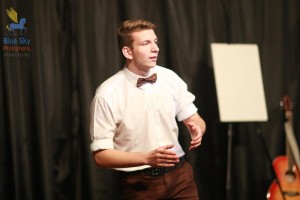
Pasha Karonchik, 16-year-old magician from Baranavichi, performing at Blue Sky’s talent day. Photo via Blue Sky Talent Company
Ei: No, no, no… basically, (in any project) before you start, you “shut up and listen.” Understanding the culture here, understanding the government here… I am a foreigner, and I respect very much the authorities here. I’m quite passionate about my work, and I’m enjoying the opportunities that this country allows a foreigner to come for a start, and actually are so enthusiastic. A lot of the activities we do, the response has been actually very positive, which awakens more energy to do more, because people respond well. Because I didn’t know anyone, I invited my friends to perform here for charity events.
I didn’t want to interrupt any legislation problems. This was a good will project that had all of my friends that were some of the best performers in music in Australia, and also, from London, a magician. It helps them also with connecting with a country they don’t know. And then I went on this path. You know, people that are entertainers, people that have some fame, can do so much to highlight social and charity works.
MH: Who were some of the performers?
Ei: Tom Ward, who is one of the best busking guitarists in Australia. He, himself, is self-developed, he evolved. He earns an estimated 1,000 dollars a day as a busker (with part of this take in on-the-spot CD sales). I learned everything not by theory, but by trying. And so what happened was, every time a foreign friend, from Australia or from London, came, they were thrilled to be able to communicate with the locals here. The basic formula is very simple; you just have to work hard and believe in yourself. It’s not that complicated to be successful.
MH: The name Blue Sky, where did it come from?
Ei: I was working at two places at the same time. This became a charity project, so I needed to sustain it with a commercial project to pay for all of this, because it’s still privately funded. I’ve never done a social project before. I’m not connected to anyone in the field. I just needed to try it for myself. I’ve even sold some of my personal material things in Australia. The Blue Sky name came from when I was doing a partnership in China with a school friend for a furniture business, helping a factory become more modernized. At the same time I wanted to do some of my own furniture design for manufacture. He’s based in Guangzhou (the former Chinese city of Canton), and I had a two-bedroom apartment in China, and so I split my time 50-50 between Guangzhou in China and Minsk, Belarus.
But my idealistic mind said that I should do well in China to pay for my project in the social sphere in Belarus. Traveling back and forth, every time I came home in China, there was just a layer of dust and soot in my apartment, on the bed sheets! And when I came here, suddenly I was so happy landing in Belarus, the sky is blue, the nature here is so beautiful. Unlike Australia, you can sit on the grass and not be attacked by insects. So, it took me some time to realize this, “Are you serious, I can sit here? What, you are eating berries from the forest and not being killed?” So again, it was a discovery by the invitation from friends, one drive out around the Baranovichi area, I just looked up and I said, my God, it’s so beautiful here. The skies, I don’t know why, just made me happy. I spoke to my team about it, Margarita told me the same. They voted, and I said, okay, well it’s a democracy here, we’ll be called Blue Sky. And it worked, people liked this name. In Russian it’s a little bit hard to pronounce, I believe. But with branding over some time, we’ve worked so hard to maintain the reputation here. Just that the culture is doing something good. To do without wanting anything in return, it’s a strange thing, but that’s what I believe a true charity should be.
Defining Talent the Blue Sky way
MH: Some of the talent that you’ve come across here, could you describe that?
Ei: It’s actually crazy. My talent is to sense or feel somebody, from just hearing their voice, the way they look the way they move, their social behavior. It’s something, maybe it’s from a part that mind that forms empathy, that when applied to talent, allows me to produce them to any point. So, if I told people that “I can take you to a place that you’ve never been to before,” and let’s not even talk about money. If you want to run fast, if you want to dance better, if you want to sing better… I don’t even need to be a technical teacher, I just need to see you or hear you doing it, because, anyone can actually improve themselves if you can hear it. But the problem with people is that you can’t hear yourself when you talk, unless you are recording and playing it back. You don’t know what you look like unless you see a photo of yourself. So the essence of self-improvement is to reflect the point of who you are through feedback. It’s kind of like a talent coach, and it’s what I enjoy doing. And here it is for me, without even opening – we’ll be officially opening soon; it took one hundred ideas to get it right. I enjoy making mistakes. People criticize mistakes so easily, but I’m proud of my mistakes, because yes it costs money, yes it costs time; one hundred mistakes, if I get one right, I’m satisfied.
During this process, each person involved here, they’re building some goodness, some good experience, yet ultimately I need to be financially viable, and working. But two years isn’t such a big sacrifice to get it right. A lot of these business projects fail even after five years. They generally say that for business, you have to overcome the five year mark to be called a success. I don’t like these overnight success kind of businesses. This needs to be done in detail from small-step improvements.
Talent here is crazy, we haven’t even open, we’ve just started to construct this place, and people have started to walk through this door. I don’t know how. Maybe a few things on social media, some word of mouth, and the people just walk in, and say, “Ah, talent company in Minsk? Are you serious? I can sing and dance, play the piano.” Okay, and it’s true, most people have been to music school, most people have done some art, the linguistics capability… they’re lucky here, they have a want to learn other languages. And they’re already bilingual, Belarusian and Russian. So then add from that, from my understanding, here, it’s English and German, and some Italian, the linguistics university here is a factory of people to learn languages. We don’t have that in Australia. But the quality of talent is very high, and a lot of it comes from people who don’t believe in themselves of these arts. The most talented people aren’t going to art school. They’re working as an engineer, they’re working as an economist, they’re all doing something else to survive because that’s what they’re told to do.
MH: Do you have any favorites that you’ve come across here?
Ei: Of course. How much time do you have? The problem is the Western term of talent only goes into modeling, music, dance, and sports. You don’t think of talent as somebody that can cook, or someone that can sew, someone that has the social skills just to make someone happy, who can just sit there and smile and give us good energy – that’s talent. To come presented nicely, to smell nice, this is also talent.
I’ll even say cleaning your toilet is talent. If you can make one feel happy when they come to your house and it’s clean, you don’t feel this “Wow, it’s disgusting,” kind of thing, cleaning is talent. Especially among migrants, I connect with cleaning very much. Korean migrant down in Australia, all of their backgrounds was everything – teachers, accountants, doctors, but they couldn’t speak English. They went to Australia, or America, especially Los Angeles, very often – what they could do was clean. And they made a lot of money, educated their children, but they had to sacrifice their dignity. Of course they had degrees, they had four years of university to become cleaners, taxi drivers, doing what they could to survive.
Have I had any favorites? Actually, they’re all my favorites, otherwise I wouldn’t be here. Margarita, I discovered her because of her linguistic capability of speaking fluent Chinese. And so she assisted my Chinese business. Now the funny thing in China: I can’t speak Chinese, but I look Chinese, but I’m Korean. They would talk to me in Chinese, she would translate back to me in Chinese, I would talk to her in English, they would talk to her in Chinese. They were very confused. And then what I do with my staff and my team members, the first thing I do in the Time Café, I ask them such as I’ll ask you, when you were a child, ten years old, what did you want to do?
MH: At ten. I think that was my astronomy phase.
Ei: So you spent a lot of time looking through a telescope at night, going through books in the libraries, looking at the constellations, looking for planets, planets reflect light from the sun, you’d go through every planet, there was nine, and every moon of Jupiter, there was 13 maybe 14, this kind of stuff. Once you have an interest in something, you study it and study it hard. But the thing is, people forget their original dreams, but it made you happy during the time that you could dream, until reality hits and you have to pay for the mortgage and the phone. But people spend a lot of time working to sustain a life to do the things that they enjoy doing. Now what if you can awaken the past and you can do what you want and sustain your life? What is this worth? It’s huge. It’s massive.
And life is short, and if I said to you, we just finished our interview here, and you were walking out the door onto the street and a car just hit you. You are on the ground, you pick up your phone and you have one last call. Blood pressure is going down, you’re panicking, who do you call?
MH: I guess my wife.
Ei: So you found the love of your life, you’ve succeeded thus far, you’ve got children, and the other thing that you think about is about: “What have I done? What have I achieved?” And this reality comes and goes.
People will hit this time of crisis at a few stages in their life. Usually before entering university, you make this huge choice: I’m going to become an economist, I’m going to become an engineer, I’m going to become an accountant, I’m going to be this. We have so many young people at ages 14-16 lost. Their biggest guidance counselors, their parents, they don’t understand their own children. They don’t understand what their children can do, and what they want. So they mold them into what they know. And it doesn’t matter what I am as well, people come up to me and say to me, “Jun, I don’t know what to do with my life.” It’s crazy.
They say Belarus is a different culture. It’s similar to Korea. There is an obligation for students to do what their parents want because their parents have paid for them. In other countries, like America or Australia, we become independent at 12-14 years, working at McDonalds, whatever, you pay for yourself. So when it comes to deciding, a lot of the good children here they do what their parents want. They could be kicking and screaming in their minds, but they still are very obedient.
And then it hits them again when they graduate. They have a big party and they have this piece of paper. “Oh my God, I’m a building engineer. I don’t know what to do!” So they start panicking because they have to go out into another direction. So it hits them again. You do your job for another 4-5 years… so I find there are these stages: before university, after university, after working for five years. So around the ages of 16, 25, and 35, it hits a few times. And people nowadays with Internet and opportunities, they do switch and change jobs. You look at a typical Belarusian resume, and by the time they hit 21, they’ve changed jobs four times. It’s incredible the job shifting that occurs here, and it’s because people aren’t finding what they want that it’s costing industry millions of dollars by having workers that are lost, and it’s costing the individual a lot of time in their life just trying to fit in.
So here, with Blue Sky and this project, Dom Talanta, it’s to sample of piece of everything and to be surrounded by the inspiration. It’s very hard to start things on your own. How many times have you started at the gym? How many times have you started to look at the guitar, and you know, strum up some eighths? You’d just like to try up a piece of something that you enjoy, you can sample everything.
Talking around the Time Café
MH: The next question I had, how did you come up with the idea of the Time Café?
Ei: Well, you know, actually my brain is a bit funny. Although I’m extremely technical, I have very strong artistic vibes, and logic is outside of my system. I just do things by crazy values. I just feel something and I have to do it, a kind of an obsessive disorder. And this is basically my brain and what’s inside. I’ve preplanned as an industrial design the whole thing as to what I thought would be functional. A place to develop dance, a space for music, technical office, I even did all the cabling for the computers, and did a lot of the mechanical objects, of like just installing the doors; it’s just too much, this is where I’ve become too obsessive, I should let it go. Margarita’s got the logic, she’s got this logical brain, an optimist, and she gives me this look, and I have to stop myself. In anything it’s a partnership, you need people to have a path, and she’s got this logical brain. We did a lot of charity drives, we gave a pitch, and suddenly we got attention. Okay that’s how it’s done: Blue Sky, people like it. People come to view talent, charity, suddenly, oh my God, I’ve spent a lot of money. Margarita comes and says, “Jun, we have to, um, pay the rent.” I replied, “Oh really, oh my God, I’m running out of things to sell.” I have to Ebay some objects in Australia, but then I look over at her, okay, we need to make money.
Alright, let’s just try this, let’s just rent it out now. One of the ideas was to rent out the space, and we spent so much time and money, developing a space to develop talent. Okay, we’ve got smart people here, we must be able to sustain this project. So every day I turned to Margarita, within her10-hour days, for new ideas, and finally she even suggested to me, like, let’s just rent it out commercially, co-sharing. Yeah, but then… I walk away. We even had some interviews with people, trying this idea, a partnership. And then I just went back to my stubborn self. I said, “Look, I didn’t come all the way to Minsk to rent out an office space. If I wanted to do that, I could do that anywhere in the world. Let’s use the space, let’s develop a program and do something good.”
The Time Café, it’s no money, I’ve got so much equipment, we just use whatever we have here. This is a space, we even advertise it as a space, and advertise for people with ideas, “What can you do with it to make money and sustain it?” In the end, people had all sorts of ideas, but for this space… it’s not a bar, we don’t have facilities for that, it’s not a studio, we can’t really do professional recording with what we have, but it’s a good place to come and learn, we have a learning room, we have a lot of technical equipment, and everyone here, I have so much technical equipment here for photography and video making and audio that they continually have to borrow. I said, “Margarita, what about a rent shop, and then everyone can benefit, even us.” Oh it’s a good idea, actually, not a rent shop, a time café. The concept is already in existence: an anti-café, where people come and read books and play games. But why not build it for talent activities. And that’s how we came. We needed Masha, who was Margarita’s best friend, also an economist. We have two economists, and I thought, wow, the power of economists. I don’t have logic, so I’ll delegate the logic to other people. Does that explain?
MH: Yeah, I was going to ask if you are following a model, but it seems like that it’s quite original.
Ei: I don’t like to copy. I like to do new things. I think we’re smart enough to try something new. The originality gives us a self-pride that we’re not another McDonalds here. It’s something that’s new and exciting. And who doesn’t like music and dancing? Sewing, if you want to sew some little bags like this, we can teach you how to sew, I’ll teach you how to sew. But people have got to find within themselves something new.
And what about yourself, do you have other, besides astronomy, what other things, outside journalism, do you do?
MH: My actual field is actually in engineering as well. I studied civil engineering when I was at the University of Alaska Fairbanks. But I’ve kind of migrated back to writing again.
Ei: So this is the satisfaction part, and engineering is the money part.
MH: Yeah.
Ei: Do you play any musical instruments?
MH: I used to play saxophone.
Ei: Wow! Can you perform on Sunday?
MH: Oh… the saxophone I had is sitting up in Sequim, Washington.
Ei: We’ll find one here. Leave that part to us. Alto sax?
MH: It was an alto sax.
Ei: Alto sax, okay. We’re very strong on music, especially jazz. We have very good jazz artists here. There’s always a need for good jazz. So you play the sax, astronomy, engineering, journalism. Sports?
MH: I didn’t really get into sports much. I was in the marching band. And I had the chance to go to Korea was in the military in the 80s.
Ei: Korea has changed a lot since the 80s. It’s gone crazy.
MH: From what I’ve seen, it looks pretty good.
Ei: Yeah, well, it’s gone to the other side at this point for me. It’s gone a little bit too busy. It’s gone from a developing nation back, pretty much it looks like what some parts of Vietnam used to look like now. But they’ve overtaken everything within that generation, technology… for me it’s a bit too much. I like a bit of nature.
MH: That seemed pretty common over there, there’s always this strong respect for nature, or what’s left of it, because of the war.
Ei: The problem is the population, Seoul is 11 million people in a city the size of London.
MH: It used to be the biggest in the world. When I was there it had just overtaken from Mexico City, for population.
Ei: Yeah its too much for me. During peak hour with people pushing you on the trains.
Where it’s all going
MH: You are creating a community here. Do you have a vision of what you want to see it to be?
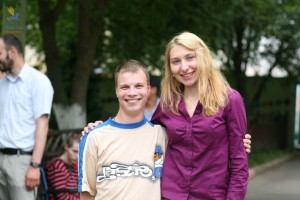
Margarita Malyshchyk posing with new friend at a boarding home for the disabled during Ambre Hammond’s Girl Piano Truck tour in 2013. Photo via Blue Sky Talent Company
Ei: Like I said I wanted a charity community that doesn’t need to have so much funding, that doesn’t need to have so much donation-model, because this is very difficult for charities to survive. Always asking for donations, doing fundraising, funding. I want to create an innovative way for a social project and social business that, based on the ideas and the facilities, can self-grow. So the strategic viewpoints for me are that you have basically an oversupply of talented people, and their enthusiasm is very high. My vision is that just to model this with the ingredients. Again it’s very simple, you have the people, you have each other inspiring each other to do something, and at the same time, everyone can just pay a small 30,000 ruble, 3 dollar fee, to come for an hour just to experience something new.
But it’s not a point of coming and saying “I can do it, you can do it!” This is the wrong thing to do here. What I see here is a lot of, as you’ve seen, outsiders come and say, “I can do it, you can do it,” and then walk out. To make a change anywhere for better, it needs to be step-by-step. There’s no overnight. And a lot of young people keep doing these websites and getting passionate and all this stuff going on. What is the reality, it’s the step-by-step. You’ve got the ingredients, you’ve got the talented people, you’ve got the optimism.
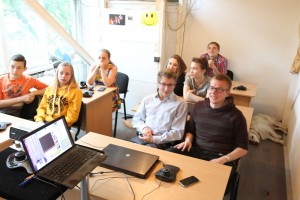
Group brainstorming ideas for a promotional video in the Dom Talanta classroom. Photo via Blue Sky Talent Company
Yet, on top of that, you have the opportunities for Belarus. The world doesn’t really know what Belarus is yet. So, we need to produce this stuff, so here, our focus is on very good production of media, of photos and videos that showcases the best talents of Belarus. And as you know, one YouTube video, even by an iPhone, you can get 11 million hits, and offers for job. So, this costs no money at all. I’m just trying to use what each person has, and the program is the most important part, so we have things like talent jams, talent shows. So the format here is during the day will be project planning – planning is very important to get it right, where we discuss with our management teams what works, what doesn’t, lessons learned. I’m applying a lot of the engineering construction project tools that we know automatically about. Project kickoff, all the basic essentials for a project that can be applied to a social project, focused on these blocks, it’s very simple, planning, ideas, and then apply learning through the master classes. You need competition in order to get better and better. Here it’s not so much about the money as it is about the recognition. And then the show, the stage performance, the floor performance, people enjoy getting this experience.
But here bars, and it’s not just here, it’s global, but here, bars don’t give you the opportunity because the audience is intoxicated and that’s not the right audience, you want a supporting audience of your friends, your family, and whoever comes. To be better in whatever talents you have, you need an audience, you need competition, and you need actually a proactive cycle of planning and development. So we have a slogan for developing talent specifically, and that is learning, developing and producing. And those three cycles help to make any individual learn. But you don’t really feel the music, or what you can do until you are performing first in front of your family, and they might scream at you because they’ve heard the same song 5 million times, but you need to take it out of that apartment and show your friend, and only because they like you they’ll tell you honestly, “Well, you might as well just learn the piano.” But you need that audience to feel honesty, and here is a supporting and honest.., and it’s fun, it’s really exciting here. The mood that you walk with out of here… We have trouble getting people in here, because they don’t know who we are.
MH: It sounds like you are trying to create a kernel that’s going to seed out into different sort of other communities that will then sort of perpetuate the idea.
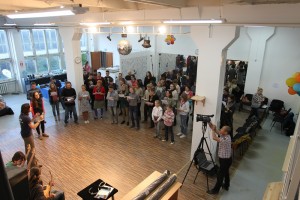
Sergey Dolgushev of the Belarusian folk-rock group VuRaj teaching a vocal master class in what is today the Dom Talanta space. Photo via Blue Sky Talent Company
Ei: Yeah, it’s a perpetual motion. It can grow by itself. And I don’t want it to be one or two people to be the epicenter. The strangest work model here is actually, I ask my workers what they want to do as part of the business, because each person has what they can contribute. So Masha is an economist, but she also has a very strong journalistic interest, as well as film. So here she’s connecting with all the journalists, she’s then doing part of the press releases. She’s working on her experiences, so…
MH: She’s the one then that’s been creating content for the website, then.
Ei: I’m actually doing most of that. I gave her too much there. In things like that, I need trust, I need to delegate. Masha’s doing the press release, and then we work with each other to review and get it better. And so each person again… the economist… and you worked in economy for a little while – two years? The whole time here, she is actively participating in what she likes, which is journalism and film. And so here, as a part of the whole Talent House, what she can do she can apply here and everyone benefits, and she’s actually our partner, not an employee, for growing this. To grow it, you need partnerships. If I want to make many millions of dollars, of course money is good, with it I can help more people, but here, if I have good partners, I have design partners, we have some engineers coming here and teaching design. Eventually, maybe Margarita can teach yoga, something she does, she can teach Chinese language. Everyone can teach. Even the small amount of saxophone – I haven’t heard you, but you can teach me some small saxophone. For me to just play something that sounds okay to me is happiness for me. I love the fact that it looks so cool to walk around with shiny things. I love jazz. I flew to Chicago. If I like live music, I’ll fly there. The vision is to grow this by itself by utilizing the resources of that region.
I’ve a strong passion to go to Venezuela after here, and my idealistic mind says it takes about two years to get it started per region. Africa is my other future passion. I spent a bit of time in Africa.
MH: What part of Africa are you thinking about?
Ei: Oh, like in the south, Mozambique, Zimbabwe, Swaziland, all those parts, because to me a lot of the pure music comes from Africa. Their cultural talent is singing and dancing. A lot of the soul, jazz, it all originates from African ethnicities. But again, theirs is a different path, they are a very athletic people.
But here, to connect them all I want to have annual talent Olympics that highlights and promotes people. They come at parties for me, just someone that didn’t believe, that walks in a little bit more shy. And I put them up on stage, and everyone goes, “Wow, that is amazing!” That is awesome. We had a guy who started as a cleaner here, during our construction. He built all this. Worked out he was an engineer and a teacher. He stood up on stage and sang Phantom of the Opera, and everyone just went “Oh my God.” That is the fun stuff here, the interaction, and that is what we need.
And back to the here and now
MH: I was going to ask you about your philosophy: “Do. Be. Live.”
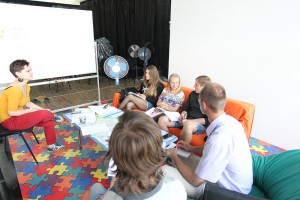
Masha Zharnikova teaches English to students Alina, Masha, Yura, Sergey, and Leonado. Zharnikova, as a collaborator, provides these language courses in partnership with Blue Sky. Photo via Blue Sky Talent Company
Ei: That took a long time, about six months. I gave my small team a task of coming up with a slogan and a logo. The logo they succeeded. The slogan, the deadline, under midnight, did not come. When you have a group of people, they all have their own ideas. We had sheets and sheets and sheets of dead paper. And as soon as you have a social project, people end up going too far. “Fly in the sky,” or “Just fly somewhere.” I wanted a slogan that fit with Blue Sky’s philosophy of client development. What other slogan was there: “Spread your wings and fly,” or something like that. I just wanted to go back to reality again.
But anyway, I just got so frustrated; nothing was coming out of these smart people. I got up on this white board here, right up in front of them, and I said, “Look guys, very good, but I really need a slogan by now. We’ve got to start, you’ve had six months. This is what I think it’s about.” And I stood up and I wrote just like that: Do something. “If you don’t do something, you’ll get nothing. You don’t do anything.” Second part was: Be someone. “Each part is connected to the first one, unless you did something, you’re not someone. If you didn’t study civil engineering, you’re not a civil engineer. But you had to be the student to become the engineer. You had to try your hand at journalism as a freelancer for a while, and then you pick up some jobs.” And the last one: Live your dream. “This life entity is just one time.”
I wrote these three phases down, and we had a very smart PR girl, Olga, who said, “Okay.” And within one second, like a jelly bean, she jumped and she highlighted the first words of the three parts. It was an uproar, everyone was clapping, we had a small party, it was midnight. Okay. Finally we got the slogan, and it was perfect: Do means do something, be means be someone, and live, live your dreams.
Margarita Malyshchyk: And it has a double meaning.
MH: Right, do be live, do believe.
Ei: So, nothing really happens overnight here.
MH: Are there any Belarusian traditions that particularly interest you?
Ei: The food makes me healthier, and I really enjoy not having fast food here. Living in all the places I’ve lived, Canada, America, Australia, even Asia, fast food is killing people, it is really evil, this stuff. And people just line up to be killed and get fat. How many McDonalds are in Minsk, six? So it’s exciting, the brand is great, it tastes good. But it’s not long-term. The food here, the portions here are good, it’s not like triple the size, I can’t eat it but I’m going to shove it down. One week in Korea and I just put on five more kilos (11 pounds). Not having fast food here is fantastic.
MH: So the cuisine is a major thing.
Ei: Ah, I love simple things. Of course we like flavor, we like fast food. But the convenience isn’t here. It’s not two steps and you’ve got KFC. You don’t do it because you don’t have that fatty smell that for humans brings them back. I’m sure you must agree that living here, it’s a pleasure not to have fast food.
MH: Excuse the non-sequitur here, but is talent inherent to special people, or can it be fostered in anyone?
Ei: It runs from parents. Now the biggest critical part about talent is the awareness of most people, because you are given talent from two parts, similar to psychology: you have your genetic structure and you have your physical body. So, some people are stronger than others. A big part of talent is inborn from people who are so smart and so talented that they think it starts at them. They’re so smart, they’re so proud at school, they pick up an instrument and play the violin automatically. For example, a group of friends at a barbecue, already someone is highlighting themselves, the one that talks and entertains, and is funny, just knows how to talk, that person has his talent. Usually you find within their close range, their mother and their father, somebody less social. If not it could skip a generation, it could be their grandparents. The other part is nurturing their talent, the other educating. For some things, if it’s already past this age, it’s too late to foster this particular talent, such as music and sports, that talent is identified at a young age. Because you cannot decide suddenly at the age of 40 decide to do gymnastics. Your bones are already degrading. But you could have that in you, to become an international gymnast, but how would you know unless you’ve tried?
So, I definitely believe that talent, everyone has got it. Not many people know what they can do until they try it, and a lot of things need to be done at a young age, especially for physically related talents. For something like music, something that is a bit more spiritual, at any time at any age. You just need time, the passion, the inspiration, and a good teacher.
But now, with Internet, suddenly, what is stopping people from developing a talent? This YouTube thing, you just type in “How to play the guitar,” boom, step-by step instruction. People are happy to give free information to teach. It’s great. Now you can teach yourself if you have something as simple as the Internet or even a smart phone. Whereas back in the day, you had to go to a library, you had to physically walk, you had to find a good teacher, you had to do so many things. Now a smart thing as an archive turns into a piano, it turns into a book… just coming back from Korea, you sit in the subway, everyone is glued to this stuff. If you think about life as being time, these smart devices are eating lives, actually. Whereas other people are playing games all day, I suppose that’s a good thing.
MH: That was what I was going to ask next, what advice would you give parents who want to foster creativity in their children?
Ei: Spend time with them. Most parents they should know. If not, we actually have students here that the parents don’t know how good their children are. The number one thing (to guard against) I think is negativity. To say to a child, “You’re no good.” This is the worst thing that you can do to a child, to say something with a negative impact. They believe in everything that their parents say. So if you say to your child, “You’re no good at sports, your writing skills are terrible,” they’ll believe it.
Independence of opinion, (achieved) by sending them out to school, getting them out to the market (is useful), but talent needs to be identified early, so, even if they take the child, and give them the love and time. To send them out to art school for a little while, to send them to sports for a little while, the coaches and teachers will assist them independently. Because a lot of parents don’t know what their child can do. And identifying a person’s talent, not everyone’s got it. And parents are just far too busy trying to survive by themselves, they just don’t have the interest, and they find their child annoying. Like, “Don’t play the piano, don’t sing, don’t do that, don’t do this!”
They say when a child is very active and very talented, they’re very annoying. They make a mess, they break everything. They’re really like a bomb went off. So continuing to tell them to tidy up, that just continues pushing the talent away. They need to break things. They need to keep running away from you. They need to be aggressive. A child that is obedient in society is not the right direction for this phase of growing a child. They need to hurt themselves. They need to make you upset. They need to do a big cut upon your table. I don’t know, the way that they get reaction….
MH: I imagine that’s quite different from the advice for someone who is trying to foster creativity in themselves. Like how would you give advice to a person that wants to do that?
Ei: At what age?
MH: Let’s start with… any age, from childhood, to teenage, to adult, to…
Ei: I’d like to say, to foster talent, you need the environment. So everybody is routine basically. You wake up, you do what you have to do, you go to school, you go to work, you come home. Nothing actually has changed. You talk to the same people, you see the same things. You see some funny stuff on the Internet, you close it. You read a book, like this was a great book, you’re inspired for a little bit. You go to the gym for a little bit. It goes back to normal. Unless your environment changes, your growth of talent is very difficult. How many times do people pick up a guitar? How many times do people watch a film? I remember watching Bruce Lee, and just kicking about hysterically. That small piece needs to be sustained for longer. So you need to put yourself in that environment.
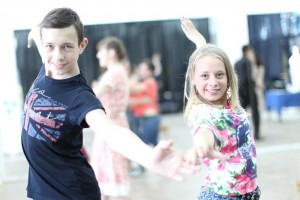
Nikita and Masha dancing Cha-Cha in Margarita Malyshchyk’s free dance class, held evenings on certain select days. Courses attract up to 16 people. Photo via Blue Sky Talent Company
The other thing, if you can travel, no matter what age, this is the biggest one. A different environment, different people, different outlook, different point of view, you need to be inspired by this. How do you inspire yourself? I think you have to keep changing your environment.
What I did myself, I did it out of a need. My root family, we didn’t have much money; we rented a house. I had to help facilitate my parents’ survival and their financial needs. I discovered so many things while just surviving, and I never felt good enough. When I worked at a job, I’d get money and I’d said, “How does this work? I got money just for being at a place!” In this world, people pay for your time, and so everyone comes generally with a monthly rate or an hourly rate. “I spend time and people give me money,” oh wow… fair enough. But I do feel comfortable, but then I ask how do I make more money? Some jobs, the more hours you do, the more money you earn. Oh wow, so does this mean if I don’t sleep and I keep working, I can make lots of money? So my daytime job, as a fitter/turner, as a mechanic, we had a lot of work to do, and as a young apprentice at 17, I decided to work more hours, Saturdays and Sundays, ultimately 16 hours a day. It doubled my money! And I was finding that still, I still had some time. I was looking to buy a car so I got a job as a DJ, called up a job for a DJ, got a job as a DJ, bought the car later. Wow, this fun job that’s making music for people is paying more than my day job. This is crazy. So I filled every spot with a different job. And then by working so hard and much, I only studied the parts I don’t like, which was design. And my engineering teacher offered me a teaching role when I was 21, earning 40 AUD an hour as a casual teacher. I was like wow, I can teach three nights a week at three hours each, more money came. This was ridiculous, more that you work, the more… then I thought, wow, my friends are going out to the bars and getting drunk and spending money, and I’m working. I had this crazy thought that I’d work hard now so that I could retire later, not retire but evolve, and then I’d have the time now, at my age, just after 40, to do projects that, this is my life project now. Work hard now, and then have the opportunity to do my dream later. So it was a sacrifice, but yeah, it’s working.
MH: A very intense early life…
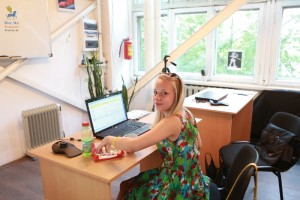
Masha Kondratova, hip hop dancer, sports writer, web publication translator. Active participant in many Blue Sky talent company projects. Photo via Blue Sky Talent Company
Ei: But it’s fun to work. Even the worst work I ever did, scraping chemical crust inside of a petroleum tank, but even during this time, my mind was active. Even though it was as silly task, you can self-perpetuate ideas in your head. Even though you are busy processing some silly task, your brain doesn’t stop. Your brain can think of ideas during this time. People can even have music in their heads and play Frank Sinatra anytime. No one can stop you from doing that when you are delivering the newspaper. It’s good.
MH: Last question I had, describe the Belarus that you’d like to see.
Ei: Actually, I’m seeing it now. I like it. You know, you can always say I want to see better, but I’ve said this many times. I’ve seen enough in my life, I’ve lived more than most people just by working at three jobs, traveling at every opportunity, working my butt off. And I felt, even though I’m around the 40 mark, I should be about 120, if you count the amount of hours that I’ve worked and lived. I’m enjoying what is here now, and I just want to capture it so much now, because I can see the future. As soon as I see all these English signs coming up, “Oh, no, I’ll have to leave again!” I like exotic, I like original culture. I like authenticity. I like people in their environment. People here are kind, honest. It can be taken differently to my culture, which is Australian-Korean. It can come across as a little bit, wow, it hit you in the face. But after you understand a little bit more about the origins and the history here, to me actually, in the two years that I’ve been here, it’s changed so fast. And I’ve seen what happened in Korea.
What I enjoyed was people’s nature, helping each other in society. And when a country becomes so developed and so wealthy, the distance between rich and poor becomes so far, it becomes a hypocritical country. I would say for an example of this is Los Angeles. Hollywood and Beverly Hills you have million dollar mansions, Ferraris everywhere, and on the other side of the street, there are homeless people eating off food vouchers. And I think, in my mind in society, why can’t you share what you have? But here in this culture here, it’s lovely. Yeah, you might talk about it kind of… but it’s actually not so bad, it’s very stable, it’s doing better than a lot of the neighbors here. But people here share, they have an automatic support network of friends and family, and here you don’t have to show yourself off while wearing something nice and having a fancy car. It takes so many hours with my friends in other places to find out who they are. Here they just invite you to their apartment, have some snacks, have some beer, and just play some card games, and spend some good time together. And this is lovely. I’m happy now. It’s very good.

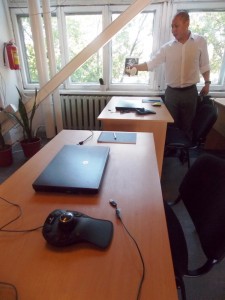
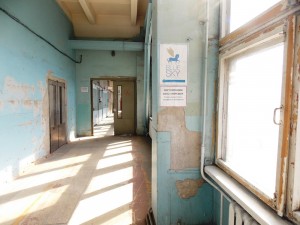
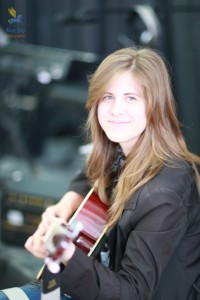
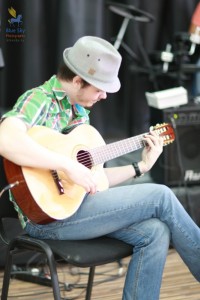
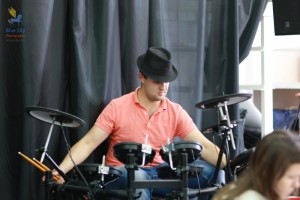
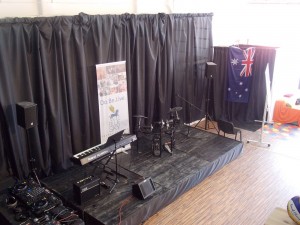
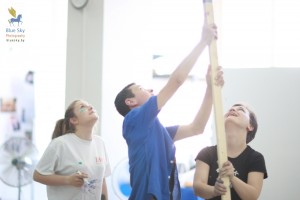
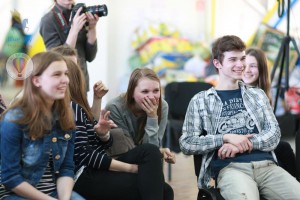
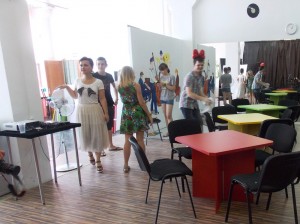
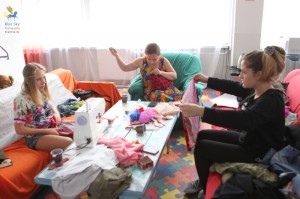
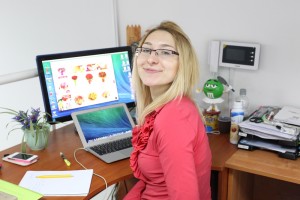
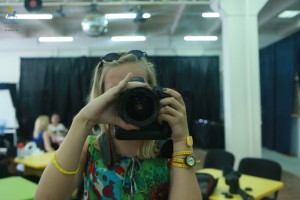





Leave a comment